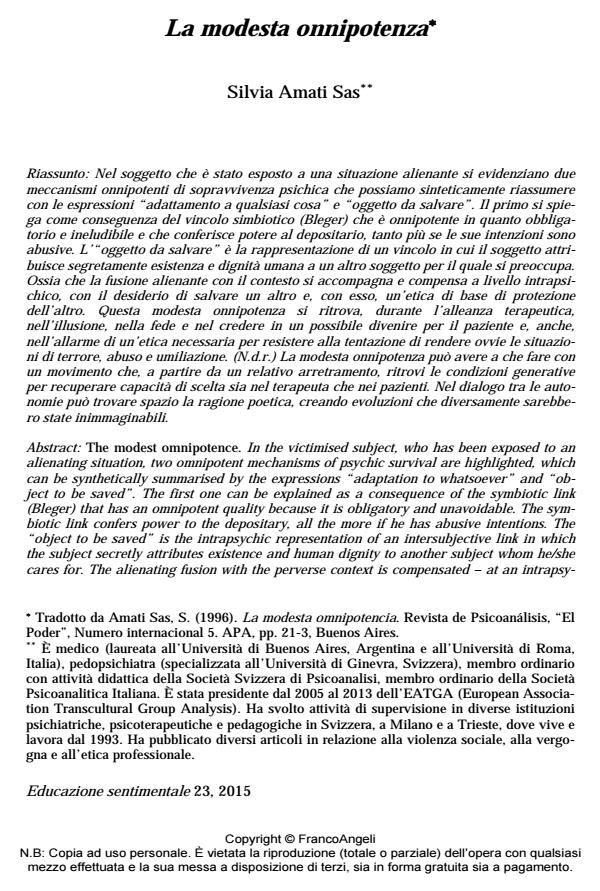La modesta onnipotenza
Journal title EDUCAZIONE SENTIMENTALE
Author/s Sas Silvia Amati
Publishing Year 2015 Issue 2015/23
Language Italian Pages 9 P. 100-108 File size 69 KB
DOI 10.3280/EDS2015-023009
DOI is like a bar code for intellectual property: to have more infomation
click here
Below, you can see the article first page
If you want to buy this article in PDF format, you can do it, following the instructions to buy download credits

FrancoAngeli is member of Publishers International Linking Association, Inc (PILA), a not-for-profit association which run the CrossRef service enabling links to and from online scholarly content.
The modest omnipotence. In the victimised subject, who has been exposed to an alienating situation, two omnipotent mechanisms of psychic survival are highlighted, which can be synthetically summarised by the expressions "adaptation to whatsoever" and "object to be saved". The first one can be explained as a consequence of the symbiotic link (Bleger) that has an omnipotent quality because it is obligatory and unavoidable. The symbiotic link confers power to the depositary, all the more if he has abusive intentions. The "object to be saved" is the intrapsychic representation of an intersubjective link in which the subject secretly attributes existence and human dignity to another subject whom he/she cares for. The alienating fusion with the perverse context is compensated - at an intrapsychic level - by the desire to save a privileged subject and, with him/her, the basic ethics of protection of the other. Within the therapeutic alliance, we find modest omnipotence in the illusion, the faith and the belief in a desalienated future for the patient and also, in the ethical alarm which is necessary to avoid the tendency to consider obvious the situations provoked by terror, abuse and humiliation. (N.d.r.) Modest omnipotence can be related to a movement which, beginning with a partial regression finds the generating conditions to recuperate the choice capacity both of the therapist and his/her patients. In the dialogue between autonomies, poetic reason can find its space, creating evolutions which otherwise would have been unimaginable.
Keywords: Omnipotence, power, spaces of subjectivity, symbiotic link, ethics, solidarity, "object to be saved", "adaptation to whatsoever".
- The 'New Economy' and the Old Problems. Prospects for Fast Growth in Postsocialist Countries Grzegorz W. Kolodko, in SSRN Electronic Journal /2001
DOI: 10.2139/ssrn.274180 - Globalization and Catching-up: From Recession to Growth in Transition Economies Grzegorz W. Kolodko, in SSRN Electronic Journal /2000
DOI: 10.2139/ssrn.248423
Sas Silvia Amati, La modesta onnipotenza in "EDUCAZIONE SENTIMENTALE" 23/2015, pp 100-108, DOI: 10.3280/EDS2015-023009